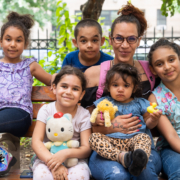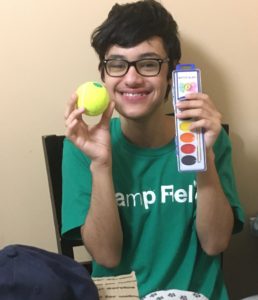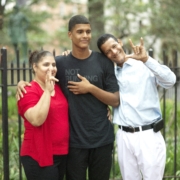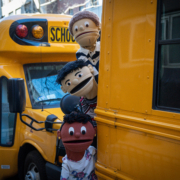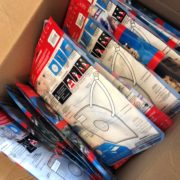The New York Foundling and the National Initiative to End Corporal Punishment proudly presents:
Preventing Abuse and Neglect in Our Lifetime: A Virtual Conference
Thursday, October 15, 2020 and Friday, October 16, 2020
Co-sponsored by:
American Professional Society on the Abuse of Children
US Alliance to End the Hitting of Children
Academy on Violence and Abuse
Prevent Child Abuse America
Stop Spanking
Keynote Speakers
Joan Durrant, Ph.D.
Child-Clinical Psychologist and Professor of Community Health Sciences, University of Manitoba
“The Global Movement to End Corporal Punishment of Children”
David Finkelhor, Ph.D.
Director, Crimes against Children Research Center; Co-Director, Family Research
Laboratory; Professor of Sociology, University of New Hampshire
“The End of Spanking in Historical and Sociological Context”
David Hansell, JD.
Commissioner, NYC Administration for Children’s Services
“Supporting Children and Families Now and in the Future: Lessons from COVID-19”
Melissa Merrick, Ph.D.
CEO, Prevent Child Abuse America
“The Power of Prevention”
Pricing and Registration
Pricing
General Admission:
Day One (October 15, 2020): $25.00 | Day Two (October 16, 2020): $25.00
Both Days: $50.00
American Professional Society on the Abuse of Children members: You will receive your discount automatically when registering.
Day One (October 15, 2020): $15.00 | Day Two (October 16, 2020): $15.00
Both Days: $30.00
US Alliance to End the Hitting of Children, and Academy on Violence and Abuse members: Please email FontanaCenter@nyfoundling.org to request your discount code.
Day One (October 15, 2020): $15.00 | Day Two (October 16, 2020): $15.00
Both Days: $30.00
New York Foundling Staff: The event is free for Foundling staff. Please email FontanaCenter@nyfoundling.org to request your entry code.
Registration:
Please click on the links provided to register:
Day 1 Only | Day 2 Only | Day 1 and 2
Once you have registered, you will receive an email with a link to your event portal which contains all the appropriate zoom links.
For questions, please email FontanaCenter@nyfoundling.org
Event Program
Day One: October 15, 2020
All times are in Eastern Standard Time
10:00am – 10:10am
Welcome: Viola Vaughan-Eden, Ph.D., MJ.; Professor and Ph.D. Director, The Ethelyn R. Strong School of Social Work, Norfolk State University
10:10am – 11:00am
Keynote Speakers:
Joan Durrant, Ph.D.; Child-Clinical Psychologist and Professor of Community Health Sciences, University of Manitoba
“The Global Movement to End Corporal Punishment of Children”
David Finkelhor, Ph.D.; Director, Crimes against Children Research Center; Co-Director, Family Research Laboratory; Professor of Sociology, University of New Hampshire
“The End of Spanking in Historical and Sociological Context”
11:00am – 12:00pm
Workshop: “Recent Research Trends and Topics”
Presenters: George Holden, Ph.D.; Professor and Chair of the Psychology Department at Southern Methodist University
Elizabeth Gershoff, Ph.D.; Amy Johnson McLaughlin Centennial Professor, University of Texas at Austin
12:00pm – 1:00pm: Lunch
1:00pm – 2:00pm
Workshop: “Spare the Rod: The Intersectionality of Race, Religion, and the Raising of America’s Children”
Presenters: Victor Vieth, JD, MA.; Director of Education and Research, Zero Abuse Project
Darrell Armstrong, DDiv, MDiv, EdS-MFT.; Pastor, Shiloh Baptist Church
2:00pm – 3:00pm
Workshop: “Let’s Talk about Race, Culture, Corporal Punishment and Child Abuse Prevention”
Presenter: Stacey Patton, Ph.D.; Research Associate Professor, Institute for Urban Research, Morgan State University
3:00pm – 3:15pm: Break
3:15pm – 4:15pm
Workshop: “No Hit Zones: A Promising Solution to Ending Corporal Punishment”
Presenter: Stacie LeBlanc, MEd, JD.; CEO, The UP Institute; President, American Professional Society on the Abuse of Children No Hit Zone National Committee
4:15pm – 4:30pm:
Closing Remarks: George W. Holden, Ph.D.; Professor and Chair of the Psychology Department, Southern Methodist University
Day Two: October 16, 2020
All times are in Eastern Standard Time
9:00am – 9:15am
Welcome: Bill Baccaglini, CEO and President, The New York Foundling
9:15am – 10:15am
Keynote Speaker:
Melissa Merrick, Ph.D.; CEO, Prevent Child Abuse America
“The Power of Prevention”
10:15am – 10:30am: Break
10:30am – 11:30pm
Workshops: Separate links will be given for the individual workshops once you have registered. Each workshop has limited capacity. You can enter another workshop if your first choice is full.
A. What’s New in Child Sexual Abuse Prevention and How to Make it Work for You
From Erin’s Law to Sex-Wise Parenting, innovations in child sexual abuse prevention policy and practice are available to help keep children safer. This workshop will review current innovations in policy and practice, and end with a focus on how professionals in child welfare and protection can support parents to promote sexual health and safety in their homes and community.
Presenter: Janet Rosenzweig, Ph.D.; Author, The Sex-Wise Parent; Executive Director, American Professional Society on the Abuse of Children
B. Preventing Child Maltreatment in New York State
This session will provide an examination of prevention efforts in New York State. The workshop will focus on the primary prevention of child sexual abuse, corporal punishment and neglect. The role of ACES and resilience in preventing child maltreatment and toxic stress will be discussed. Presenter: Timothy Hathaway; Executive Director, Prevent Child Abuse New York
C. Prevention of Psychological Maltreatment
Psychological maltreatment/emotional abuse is the least understood and most pervasive form of child maltreatment. This workshop will enable participants to define the term and will describe the FAIR system, an approach to assessment allegations and substantiation determinations that is now in use across the U.S. armed services. Our research has found that this approach to assessment and substantiation results in significant declines in subsequent maltreatment as compared with typical approaches. The implications for child welfare systems and families will be explored. Presenter: Amy Slep, Ph.D.; Professor, New York University
11:30pm – 12:30pm: Lunch
12:30pm – 1:30pm
Keynote Speaker:
“Supporting Children & Families Now and in the Future: Lessons from COVID-19”
David A. Hansell, JD.; Commissioner, NYC Administration for Children’s Services
1:30pm – 1:45pm: Break
1:45pm – 2:45pm
Workshops: Separate links will be given for the individual workshops once you have registered. Each workshop has limited capacity. You can enter another workshop if your first choice is full.
A. Effective Program Models for the Prevention of Child Maltreatment
This workshop will highlight effective program models for the prevention of child maltreatment. There are quite a few prevention methods useful to effectively address and mitigate various types of child maltreatment. We will review the risk factors, the absence of which could be considered protective factors. Examples of highlighted models are home visiting interventions, parent education programs, school and child-care based interventions, and community level interventions. Finally, there will be a discussion regarding barriers to child maltreatment prevention programming in the context of historically oppressive systems.
Presenter: Darcey Merritt, Ph.D.; Assistant Professor, New York University
B. Work in The Education and Child Welfare Intersection
Jessica Nauiokas is the co-founder and head of school at Mott Haven Academy Charter School. She will be discussing lessons learned from the first-of-its-kind charter school for child welfare-involved children and youth in grades Pre-K – 8. Haven Academy is a public charter school that utilizes a specialized trauma-sensitive curriculum to help close the achievement gap for children in foster care and the child welfare system, some of whom have been victims of trauma, abuse, or neglect. The revolutionary school will be discussed in depth during this workshop.
Presenter: Jessica Nauiokas, B.S.W., M.Ed.; Principal, Mott Haven Academy Charter School
C. Professionalizing Roles to Prevent Abuse & Neglect for People with Developmental Disabilities
This workshop will examine important career pathways and stepping stones in professionalizing the role of Direct Support Professionals (DSP), to prevent abuse and neglect. We will explore Core Competencies and access to educational opportunities, which will also increase retention. By offering access to information and education in an enjoyable and engaging way for DSPs and other professionals supporting people with developmental disabilities, DSPs can obtain the necessary prerequisite skills to provide support to people in the way they choose to be supported.
Presenters: Renee Pili; Assistant Vice President, DD Division, The New York Foundling MaryBeth Witkop; Assistant Vice President, DD Division, The New York Foundling
3:00pm-3:30pm
Closing Session: Haven Kids Rock Video and Q&A
Haven Kids Rock is a music program that was created for at-risk kids in the New York City child welfare and foster care systems. Rock guitarist Jimi K. Bones and musician and casting director Nefertiti Jones founded Haven Kids Rock in 2008 to provide children with a creative/enriching/therapeutic outlet. The weekly music program resides within Mott Haven Academy Charter School in the South Bronx and shares a close partnership with The New York Foundling.


